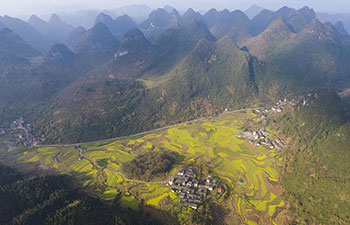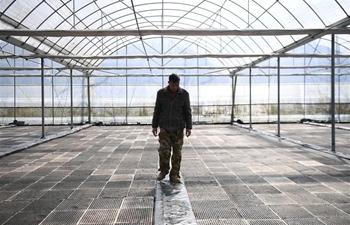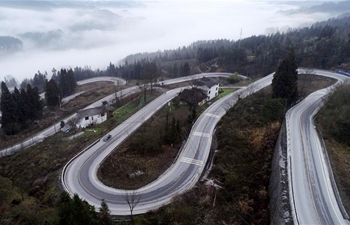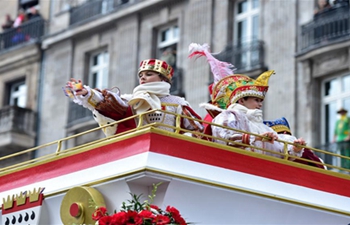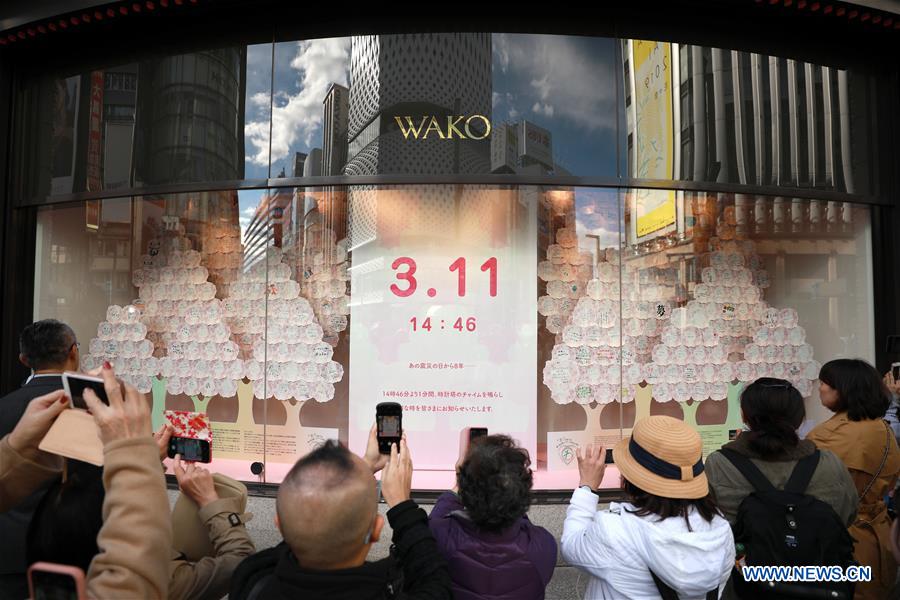
A department store displays a memorial window to mourn for the victims of the March 11, 2011 earthquake-triggered tsunami during a memorial ceremony in Tokyo, Japan, March 11, 2019. Ceremonies were held across Japan on Monday to mark the eighth anniversary of a powerful earthquake-triggered tsunami, which obliterated swathes of the nation's northeastern seaboard and triggered the worst nuclear crisis since the 1986 Chernobyl disaster. A moment of silence was observed at a ceremony held in Tokyo and supported by the government. (Xinhua/Du Xiaoyi)
TOKYO, March 11 (Xinhua) -- Ceremonies were held across Japan on Monday to mark the eighth anniversary of a powerful earthquake-triggered tsunami, which obliterated swathes of the nation's northeastern seaboard and triggered the worst nuclear crisis since the 1986 Chernobyl disaster.
A moment of silence was observed at a ceremony held in Tokyo and supported by the government.
The National Theater in Tokyo fell silent at 2:46 p.m. local time, as did many other locations around the nation, in remembrance of the exact time when the 9.0-magnitude quake rocked Japan.
"We will continue to undertake reconstruction work with a commitment to providing seamless support through the various stages of livelihood rehabilitation and further accelerate the reconstruction work," said Japanese Prime Minister Shinzo Abe at the ceremony in Tokyo.
His remarks were made as around 52,000 people are still regarded as evacuees who have not gone back to their hometowns in the affected areas after the March 11 disasters eight years ago.
Overall, the triple disasters claimed lives of 15,897 people.
According to the latest figures, around 47,000 people were forced from their homes in the days and weeks following the disasters, and 2,533 remain missing or unaccounted for.
As of March 8, another 3,701 had died owing to post-disaster health conditions, the National Police Agency said.
The government said it will disband the Reconstruction Agency that was formed a year after the disasters to ensure that reconstruction work proceeded in a coordinated and consolidated fashion.
But figures have shown that in the hardest-hit prefectures, around 1,300 people are still living in temporary accommodation as there have been delays in the building of new residences.
Eight years also mark the time for loans given out by municipalities to help individuals and local businesses rebuild to be paid back, which is an impossible task for people who are still barely making ends meet.
Owing to the stigmas still associated with radiation, those working in the farming or agricultural businesses have struggled to recover, due to bans and external concerns about produce coming from Fukushima, home of the still stricken Daichi nuclear complex.
"The rebuilding and revival of Fukushima is a top priority agenda," said Yoshiaki Harada, minister for nuclear emergency preparedness.
He added that people are still unable to return to some areas close to the stricken plant, due to high levels of radiation.
In Fukushima, there are seven municipalities that are still deemed uninhabitable and remain cordoned off as radioactive waste continues to be piled up on the sides of the streets.
Tokyo Electric Power Company Holdings, Inc. (TEPCO) and the government have said in their most recent analysis of the situation that the exact plan as to when and where to begin the decommissioning process of the nuclear plant has yet to be decided.
The decision on which reactor will be the first to have spent nuclear fuel removed and the technology to achieve this will be decided within fiscal 2019, they had initially said.
The removal of the spent fuel, assuming suitable technology can be developed, is currently expected to start in 2021, the government and the utility have tentatively decided.
The likelihood is that the overall decommissioning of the plant will take decades, as locals continue to languish in the wake of the triple-disasters.
"I am deeply concerned for the physical and mental health of the afflicted people, especially the elderly who become more vulnerable year by year," said Prince Fumihito, the younger son of Emperor Akihito, at the ceremony in Tokyo on Monday.

